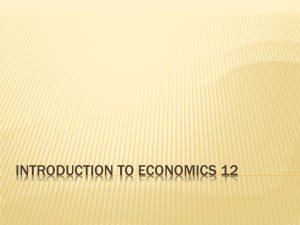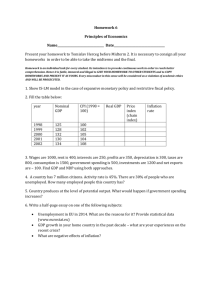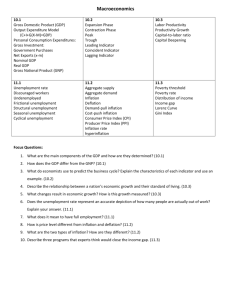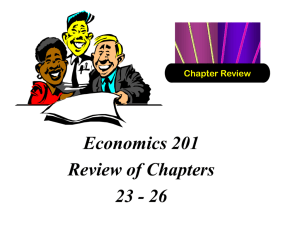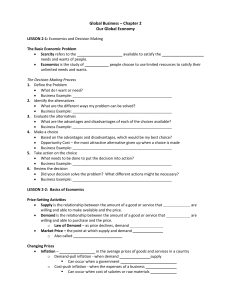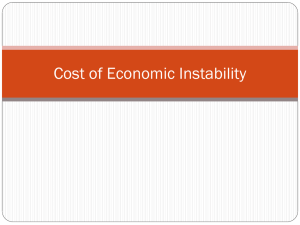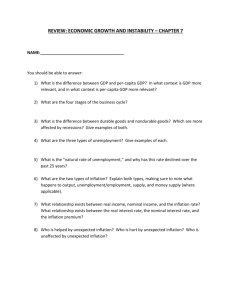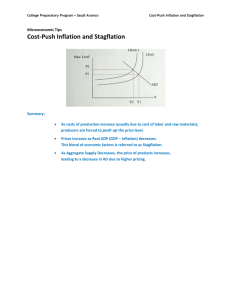File
advertisement
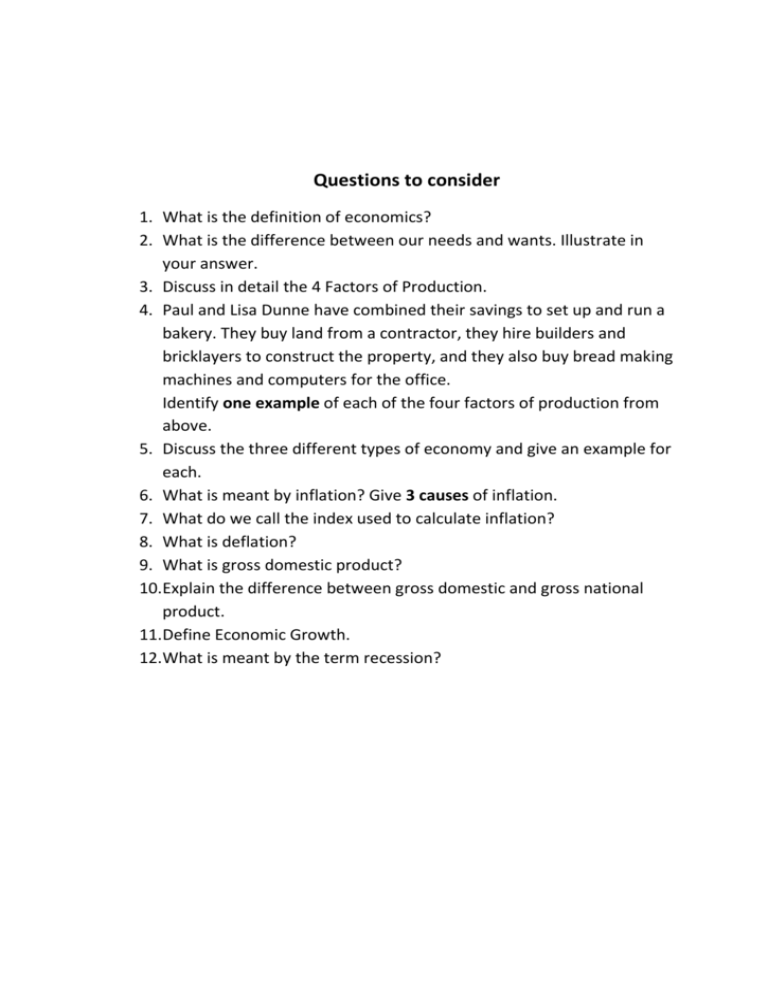
Questions to consider 1. What is the definition of economics? 2. What is the difference between our needs and wants. Illustrate in your answer. 3. Discuss in detail the 4 Factors of Production. 4. Paul and Lisa Dunne have combined their savings to set up and run a bakery. They buy land from a contractor, they hire builders and bricklayers to construct the property, and they also buy bread making machines and computers for the office. Identify one example of each of the four factors of production from above. 5. Discuss the three different types of economy and give an example for each. 6. What is meant by inflation? Give 3 causes of inflation. 7. What do we call the index used to calculate inflation? 8. What is deflation? 9. What is gross domestic product? 10.Explain the difference between gross domestic and gross national product. 11.Define Economic Growth. 12.What is meant by the term recession? Economics Introduction Economics is the study of how we make the best use of resources in order to satisfy the requirements of as many people as possible. Think about these statements I can’t get the new Fifa 2015 because I need to buy a birthday present for my brother. Our business only has enough money to produce one of the two new products we wish to make; we cannot afford to do both. E.g. we have an idea for a new product for summer leisure in the garden, we can only choose one- an inflatable television or inflatable swimming pool? What choice will we make? vs I can only buy either a new top or a new skirt from TopShop but I can’t afford both. (Opportunity Cost) As the Minister for Finance, I will spend more money on education than I will on infrastructure- I can’t spend the same amount of money on both. All these statements are choices that can affect all members of society. This happens because we do not have enough money to do everything that we want to do. Therefore, we must decide on our priorities and what is most important to us at any given time. The requirements that we refer to in our definition of economics are known as our needs and wants. Think back to your CSPE classes. Needs: the essential items we need to survive. Wants: items we would like to have in addition to our needs. Let’s make a list of everything we would consider to be needs and wants. We will think/pair/share for this exercise. The resources mentioned in the definition of economics refer to the items that are available to us to produce goods and services. There are not enough resources available for us to produce everything we would like to produce. These resources are known as THE FACTORS OF PRODUCTION. The factors of production are the resources that help to produce a product or provide a service. The 4 factors of production are: (CELL) LAND LABOUR CAPITAL ENTERPRISE 1. Land: Anything provided by nature that helps to produce the good or service. Payment made to suppliers of land is rent. Examples of land items would be Agriculture- Farming crops. Fishing Mining Oil Production Climate- Think of sunny holidays or snow for skiing. Many countries use the weather as a natural resource to attract tourists. 2. Labour: This would be any human effort that helps to produce the good or service. Payment made to suppliers of labour is wages. Examples of labour would be: Teachers Dentists Doctors Sales Assistants Carpenters 3. Capital: Anything made by humans that are used to assist in producing the good and services. The money invested by the business is often loaned from a bank to buy the good and services that are used in this production. Therefore the people who loan the money receive interest on repayments. Thus, the payment for capital is interest. Examples of capital would be: Trucks Computers Machines Factories 4. Enterprise: This is the special form of human activity that organises the other three factors of production and bears the risk involved in production. Think about products that go through a process and then end up on Dragons Den. The people who provide this are known as entrepreneurs. They arrange the finance and run the business. They will receive a profit as payment or may suffer a loss if the enterprise is unsuccessful. Therefore they bear the risk. Land/Labour/Capital cannot work on their own, and it is the entrepreneur through enterprise that coordinates the other 3 factors of production into a productive and hopefully profitable unit. Chain of Production for BREAD Economic Systems As countries have developed over time, they devise different economic systems in organising their economic activities. These economic systems include: What goods and services will the country produce? How will the goods and services be produced? Who is the benefit from the production of these goods and services? Over time three systems have evolved: 1. Free enterprise economy (capitalism) All resources are owned by private individuals or by companies and used for their benefit only. The government plays a limited role in this type of economy. The free enterprise system allows any individual or group of people to start and operate a business with minimal government regulation or interference. Free enterprise systems are run on the basis of consumer sovereignty, which means that consumers are the ones that drive demand and the products and services that are sold. A free enterprise economy is the most efficient and cost-effective way of doing business. There is less waste in the use of natural resources because everything is driven by consumer demand. Though free enterprise economies run on their own with little government intervention, the government will intervene if antitrust laws are violated or when natural resources are limited. 2. Centrally planned systems (communism) All resources are publicly owned by the government on behalf of all citizens. The government controls all of the economy. The wealth and equality is divided among the people in which no man is richer and no man is poorer. No one is left behind. Example: You have barely enough food for your own family and your neighbour has none at all. You make sure in all equality that even though you may barely have food, you must give some to your neighbour. You both will eat dinner tonight even if it is not the full suggested amount. Mixed Economies Mixed economies allow most of the major economic decisions to be made by the private sector, but the government intervenes to ensure the supply of essential goods to everybody. In a typical mixed economy, the government may run such things as the postal service, rail lines, libraries, and in some cases, the health care service. Even in industries which are not owned or run by the government, its influence is very noticeable in the form of taxes and regulations like wage controls. –Minimum wages. Economic Costs Because resources are scarce and because we must make choices in relation to our resources and needs, there is always an opportunity cost involved in all transactions. Opportunity cost is the item (s) we chose to do without when we have to make a choice between products and services. vs €50 €50 We choose one and forgo the other. Inflation It is the increase in the general level of the price of goods and services over a period of time. It is the increase in the standard of living in a country from one year to the next. 2000- Cinema ticket= £3.95, 2014 cinema ticket = €10.50 (UCI/Odeon Blanchardstown) The official measurement for inflation is known as The Consumer Price Index €30.00 vs 2011 €35.00 2012 Formula we use to calculate inflation is: The increase in price in year 2/price in year 1 x 100 Causes of inflation An increase in the cost of producing the good is passed onto the consumer so the business can maintain a profit. Think of petrol prices. Demand exceeds supply. Limited Edition Rolex Watch. The cost of importing the goods increase. This is known as imported inflation. We either pay the extra cost or do without the goods. Increases in indirect taxes. The budget at the end of the year will often raise prices in Ireland with the likes of VAT increases on certain products. An example would be a bottle of wine increased €1 in the budget 2013. So what are the effects of inflation? 1. The cost of living rises as goods become more expensive. 2. Demand for wage increases due to inflation. This can have a knock on effect as producers may increase prices to recoup extra cost of the increased wages. 3. Discourages saving as people will spend their income now before the goods get more expensive in the future. 4. Price of exports will increase due to added cost arousing from inflation making it difficult to sell them. 5. May cause Irish people to buy cheaper imports rather than home grown products to save money. This may make it difficult for Irish firms to compete with competitors in the market. So what do we think deflation would be? This is the decrease in the standard of living from one year to the next. E.g. A meal in a restaurant was €10, now costs €9. Gross Domestic Product Gross domestic product is the total amount of goods and services that is produced within a country from one year to the next. It is measured in money terms. If Ireland produced 1,000 products at €5 each, the GDP would be €5,000. Gross National Product This is the Gross Domestic Product that is produced less the foreign direct investment in an economy plus profit sent back to a country from abroad. In Ireland for example, it is all products made less all the profit made by NonIrish firms that is sent back to the home country plus profit made by Irish firms that are operating abroad. GNP= GDP - FDI + Profits made abroad So why is the distinction between GDP and GNP important? Well there may be a significant amount of money that is sent back from companies operating in a home country. Therefore the GDP reflects total goods produced while GNP is a true reflection of money left in a country for spending and saving. Economic Growth vs. Negative Economic Growth *Very Important* Economic Growth occurs when we produce more goods in a country in one year than we produced in the previous year. So if we produce more goods in 2012 than in 2011, there would be a period of economic growth. Example Produce 1,000,000 (one million) products at €10 each in 2011, produce 1,100,000 products at €10 each in 2012. 2011- €10 x 1,000,000 products/services = €1,000,000 (GDP) 2012- €10 x 1,100,000 = €11,000,000 (GDP) Economic Growth has occurred as GDP has risen by 1,000,000 (million) in 2012. However if the average price of the good was to rise and not remain the same, i.e. the cost of the goods were €11 as opposed to €10 in 2012, this would not lead to economic growth as inflation would have caused the price of the goods to rise. Negative economic growth would therefore be when we produce less goods and services from one year to the next. The benefits of economic growth Employment will rise: As the economy experiences growth, there is in turn more demand for people to work to produce the products and services. More choices: As the economy grows, new businesses will come onto the market giving consumers more choice for products and services. Rise in Standard of Living: People will have more money to spend and access to products and services. Government Finance goes up: Revenue will increase as more people have money to spend and will therefore buy goods and services. This will lead to an increase in taxes collected by the government. So what do we know about Ireland? Do we have a period of economic growth or are we in what is known as a recession? Have we heard recession before and what do we know about it? Answer: The Central Statistics Office measures the amount of goods and services produced every 3 months. If less goods and services are being produced in 2 consecutive quarters then the economy of that country is in a recession.
